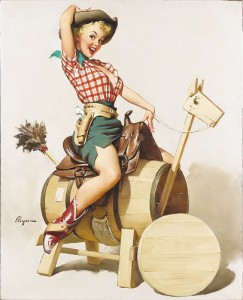
Historiann has an excellent post up about her refusal to adopt parent or non-parent status as a blogger. The comments section are worth a look for all of you who affiliate or don’t with parental status. Here’s a brief excerpt:
For the most part, this is because I blog with my professional identity up front, not my personal life or reproductive history: in other words, I blog as Historiann, not Mommyann or Not-mommyann. I’m qualified to write about history and politics because of my training and expertise in American history, whereas I don’t think that motherhood alone (if it pertains to me) would qualify me to write about anything other than my personal experiences as a mother. As a good feminist historian, I don’t believe that there’s anything essential, unifying, or eternal about the experience of motherhood. But, this refusal to identify myself either as a mother or a nonmother has also raised questions of authority. This becomes apparent when commenters disagree with me [when I write about motherhood from my perspective as an American women’s historian]—they sometimes assume that I’m not a mother, and therefore question my authority to write about issues pertaining to maternity. I had thought that essentialism went out of style in feminism more than twenty years ago—but the blogosphere makes it apparent that essentialism about maternity endures, even among women in the academy.
Authority as maternity is an important concept, and I think her larger point is about how this essentialism means that women becomes coded primarily as “mothers” or “mommies” in opposition to their academic agendas. Yes, women use maternity as will to power as well, but as a junior scholar, the question for me is more how does motherhood *mark* me or *not* as a scholar. (For instance, I once had a colleague a while ago tell a student that “I was just a mommy” as opposed to scholar, writer, lecturer, budding fashionista, etc.) Gender matters, and so does the construction of supposed parenthood. What strikes me about Historiann’s post is how the label functions particularly for women to somehow suggest that we aren’t serious, dedicated, or scholarly as our male counterparts, in spite of their status as parent or non-parent. Perhaps, her strategic move is the best one: keep them guessing. I fear that I am too obvious, too easy to pigeon hole.
A couple of weeks ago, I typed up a post about my own struggle with how to parent, to write, to research, and to teach (not to mention how to stay sane), but I didn’t post it. This occurred partially because it would mean reflecting personally on my academic blog, but also because I wasn’t sure how this might appear to potential employers, collaborators, or anyone else if they happened upon this blog. Yes, maternity can function as will to power, a claim of authority over women, but as Historiann notes, it is also as weighty tool to wield against women as well. Essential claims about motherhood signal all we need to know about a woman is parent or not.
So, now, I post Historiann’s excellent run-down of the situation, and perhaps, I’ll add my own contribution soon (or not).
Well I was always advised not to have children if I wanted to be perceived as employable, and I have sat on search committees which discarded applications from women of childbearing age UNLESS they already had kids. It’s a real problem.
I was taught you should have children as late as possible, when you were ready to settle down, but from what I’ve observed I think as early as possible is better if you want them and also a career. I realize this is counterintuitive, yes.
P.S. what I actually meant to comment:
“Authority as maternity is an important concept”
Yes, and I haven’t grocked this yet. Very interesting.
Kelly–thanks for the link and the further thoughts on this. My comments about essentialism & maternity were more about the “will to power” you write of here–how some women assume that maternity authorizes them in a way that scholarly effort does not, at least w/r/t motherhood. But I absolutely think you’re right to be concerned about how motherhood marks you, and how it will affect how people “read” you as a potential future colleague, historian, teacher, etc.
I guess another reason I don’t write with complete transparency about my personal/domestic life is that I don’t think it’s nearly as interesting as writing about American history, women’s issues, public affairs, etc. There are still kids-n’-cats blogs, but those aren’t the ones I read. (I think fB has perhaps come to assume the photos of kids-‘n-cats function of their lives.)
For some reason, I don’t think I’m getting pingbacks or trackbacks when you link to me here–but your links come up from Religion in U.S. History. If you link to something on my blog again, shoot me an e-mail if I don’t comment within a day or two–I may not have seen your post.
But in the meantime, I’m going to put you on my blogroll, sista!
Historiann, thanks for stopping by. Your post about motherhood really solidified my thoughts on the subject, and I think you were able to deftly invoke maternity as authority in way that was helpful to me. You are my blogger hero(ine), so I appreciate the additional feedback. Also, I think that my scholarship is much more interesting than my maternity (I have a facebook page for pics of the kid), but it is unnerving how often other people attempt to define me strictly by my “mommy” status, as if that somehow calls into question my scholarly authority. Bah.
I’ll check into the trackbacks and pingbacks, and I’ll email along next time just to be safe. Thanks for adding me to the blogroll. Maybe I can meet you in “real life” at the Berks this summer. Cheers!